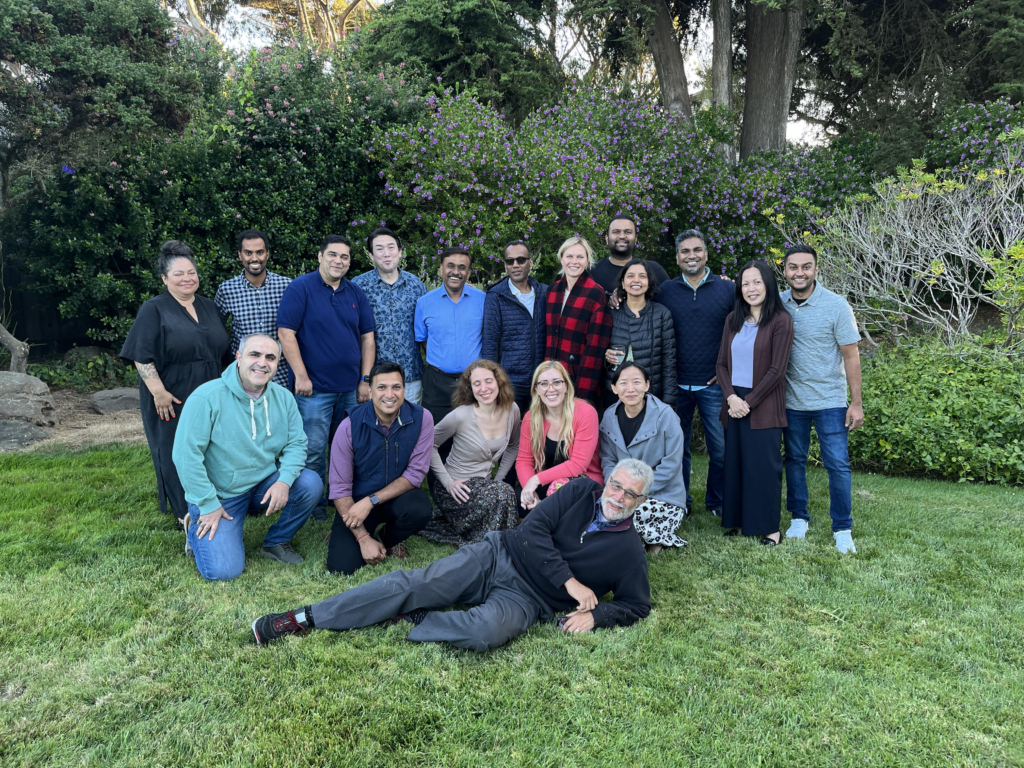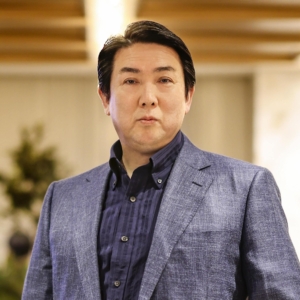
Santa Clara University’s Leavey School of Business EMBA Class of 2024 group photo, taken at Pajaro Dunes during their opening residency.
Every other weekend, Koji Omura gets on a plane in Tokyo on Friday night and flies more than 9 hours to San Francisco. With the time change, he arrives in the U.S. Friday morning.
He attends executive MBA classes from 5 to 9 p.m. Fridays and 9 a.m. to 5 p.m. Saturdays. Then, he gets on a flight back to Tokyo Sunday morning. By the time he lands in Japan early Monday morning, he’s ready to start his workweek: Running two publicly traded companies while managing AVISPA Fukuoka, a professional Japanese soccer team.
An executive MBA isn’t a walk in the park for anyone. Between classes, families, demanding full-time jobs, and extracurriculars, EMBA students are pulled in multiple directions for the entirety of the program. Omura’s commute, though, sounds particularly grueling.
“I study and sleep on the plane. There is no wasted time,” he tells Poets&Quants. “Of course I feel it is worth it.”
WHY SCU LEAVEY
When considering an MBA, Omura looked at U.S. programs with close ties to Silicon Valley. He didn’t choose UC-Berkeley Haas School of Business nor The Wharton School in San Francisco, both MBA powerhouses with top-ranked executive programs. He chose Santa Clara University’s Leavey School of Business, sometimes referred to as the valley’s hidden gem.
“I chose the EMBA at SCU primarily because of its U.S. program, the philosophy of Santa Clara University, and the high quality of the teachers and classes. The (school’s) strong ties to the Silicon Valley economy were attractive to me,” says Omura, 57, president of APAMAN Inc. and Director, SystemSoft Inc. in Japan.
Leavey’s 20-month EMBA is a small, cohort based program enrolling about 30 students per year. The average work experience is 17 years. While the majority of the program’s students still come from the Bay Area, it is attracting more students from outside, including internationally, EMBA faculty director Jo-Ellen Pozner told P&Q this spring. While the school has always enjoyed a larger profile in the Pacific Rim, Pozner says, the school has steadily moved up in regional and national rankings which has caused people to take note.
In February, Dean Ed Grier told P&Q he wants Leavey to have a larger global footprint as part of the school’s Leavey PLUS strategic plan. Students like Omura are often attracted to its location and close ties to Silicon Valley. Leavey’s executive programs are designed for executives not just in tech, but the whole entrepreneurial ecosystem.
Poets&Quants reached out to Omura to find out what attracted him, a Japanese businessman with a killer commute, to an EMBA program half a world away. Our interview is presented below.
Tell us a bit about your professional background.

Koji Omura
I run two publicly traded companies in Japan, one in real estate and the other in real estate technology. APAMAN, our real estate business, has about 1,000 stores, about 400,000 placements per year, and about 1 million rental units under management.
SystemSoft, a real estate technology company, provides real estate cloud services to approximately 60,000 stores. I also manage a J1 professional soccer team.
When and why did you start thinking about getting an MBA?
I started thinking about getting an MBA about four years ago. I had to expand my business in the U.S. because I was considering going public in the U.S. I was also looking for a way to expand my business in Japan.
However, since 99% of our current sales are in Japan, I needed to learn about business in the U.S. and globally, so I applied to Santa Clara University, which has a worldwide reputation for MBA programs.
Did you consider a traditional, part-time, or online MBA?
I considered an online MBA, but I chose the EMBA because of its emphasis on interactive learning with professors and classmates.
Why did you choose SCU Leavey EMBA? Did you consider other programs as
well?
I chose the EMBA at SCU primarily because of its U.S. program, the philosophy of Santa Clara University, and the high quality of the teachers and classes. The (school’s) strong ties to the Silicon Valley economy were attractive to me. I especially love the university’s philosophy of generously offering guidance and support to help students grow.
I also run over 30 companies and non-profit organizations, so it was not easy for me to study in the U.S. during the week. A weekend-centered curriculum was also important to me.
What has been the most valuable part of the experience so far?
There have been many valuable learning experiences. To cite just one example, learning how to be a leader from Dr. Barry Posner in EMBA 900, Leadership in Dynamic Environments. “Enable Others to Act” has changed my relationship with my employees. I also regularly look back and study his book “The Leadership Challenge” as my management bible.
Next, I learned multiple and single regression analysis from Dr. Andy Tsay in EMBA 903, which changed my decision-making structure. I manage a professional soccer team, and I use multiple regression analysis to calculate the relationship between team wins and player compensation. It has enabled me to make extremely theoretical and unambiguous decisions.
Finally, I run a volunteer organization that supports displaced persons in Ukraine. Specifically, we provide free housing to displaced people, generators to war zones, and rehabilitation of destroyed buildings. I am working with many organizations and companies to expand this support organization, in which all of us are volunteers. I am also using what I learned at EMBA to manage this organization, which brings together many people with no vested interest.
How valuable is the experience and expertise of your classmates in your own learning? Is that a major selling point of an EMBA, do you think?
My classmates’ expertise has been helpful; I didn’t fully understand the specific use of NFTs, but my classmates carefully taught me how companies in the U.S. use NFTs, and I have now started my own NFT business in Japan. We exchange business knowledge with each other all the time, a major selling point of EMBA.
Would you benefit from the option to do some sessions online, either through live-virtual classes, hybrid delivery, or even asynchronous online content?
I am certain that I would benefit. However, I am currently studying about 10 hours a day to create assignments, prepare and review, etc., and I do not have the time to work on this right now.
What are you hoping to get out of your EMBA? Are you looking to advance in your current company, pivot, change jobs?
I feel that the most important thing through EMBA is to improve my personality as a manager; I have learned a lot from SCU’s philosophy.
Anything else you’d like to add?
I would like to thank SCU and my professors for their guidance and for making my life so fulfilling.
DON’T MISS: How This Father, Global Product Manager & Wharton EMBA Finds Balance AND How The Kellogg EMBA Is Helping This Latin American Entrepreneur Accelerate His Business





Questions about this article? Email us or leave a comment below.